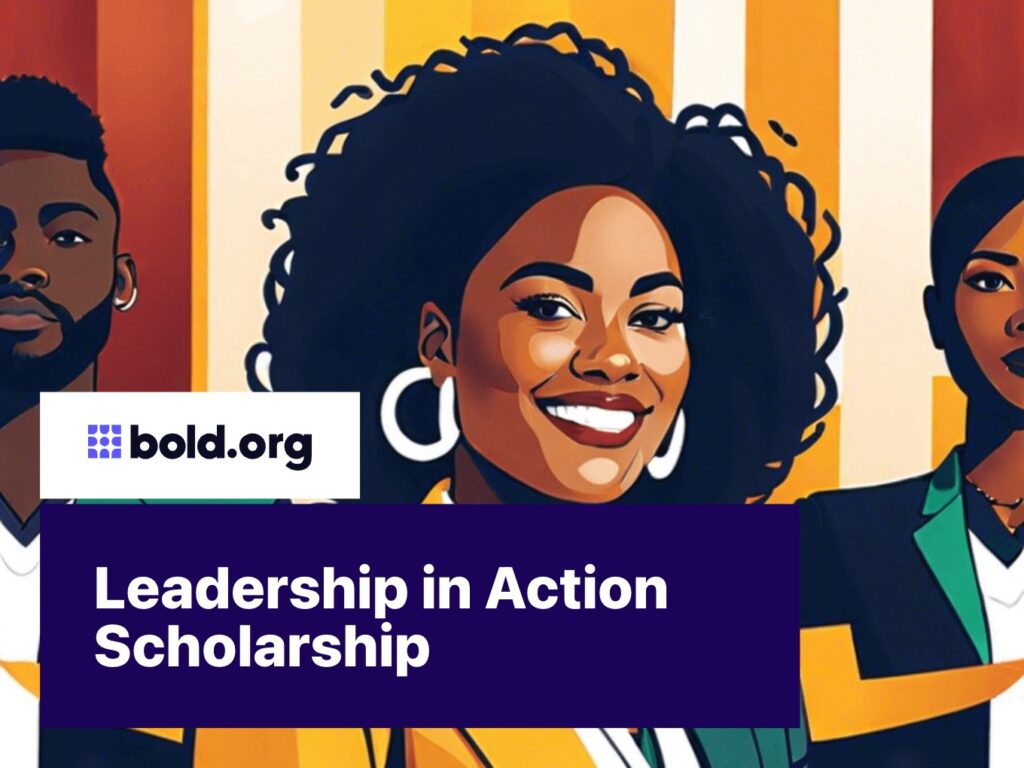I remember the knot in my stomach every time the college tuition bills arrived. It wasn’t just a number on a page; it felt like a heavy stone, threatening to sink my dreams before they even had a chance to float. My family wasn’t wealthy, and the idea of accumulating a mountain of student debt loomed large, casting a shadow over the excitement of higher education. That’s when I first stumbled upon the phrase "leadership scholarship." Honestly, at first, it sounded a bit grand, almost intimidating. I pictured towering figures, presidents of huge organizations, people who seemed to have been born with a megaphone in one hand and a strategic plan in the other. I was just… me. A student trying to get by, occasionally volunteering, sometimes taking the lead on a group project, but nothing that felt particularly monumental.
The more I looked into it, though, the more I realized my initial perception was a bit off. A leadership scholarship isn’t just for the obvious, loudest voices in the room. It’s for those who show initiative, who inspire others, who solve problems, and who genuinely want to make a difference, whether on a small scale or a large one. It’s about potential, about character, and about a demonstrated commitment to serving beyond oneself. This realization was like a tiny spark in the dark. Could this be a path for me? Could I, with my somewhat modest experiences, actually qualify for something that sounded so significant?
My journey into the world of leadership scholarships began not with a grand epiphany, but with a quiet introspection. What had I done that could be considered leadership? I started jotting down everything: organizing a bake sale for a local animal shelter, even though it was just me and a couple of friends; tutoring younger students in math, seeing their faces light up when they finally understood a concept; spearheading a campaign to collect books for the school library; mediating a disagreement between classmates during a group project. These weren’t earth-shattering acts, but they were instances where I took responsibility, where I helped guide others, or where I simply saw a need and stepped up to fill it. It was about seeing the thread of influence, of initiative, running through my everyday life. This exercise wasn’t just for the scholarship application; it was a powerful lesson in self-recognition. It taught me that leadership isn’t about a title; it’s about action.
The search itself was overwhelming. There were so many scholarships out there, each with its own criteria, its own essay prompts, its own deadlines. It felt like sifting through an endless digital haystack, hoping to find a needle that fit my unique story. I spent countless hours on university websites, scholarship databases, and even local community organization pages. I learned quickly that perseverance was key. Many times, I’d read through the requirements and think, "Nope, not me." But then I’d push myself to re-read, to really dissect what they were asking for, and often, I’d find a connection I hadn’t seen at first glance. It was a learning curve, understanding how to interpret the language of scholarship committees. They weren’t looking for perfection; they were looking for promise.
One particular leadership scholarship caught my eye. It was from a foundation that valued community engagement and innovative thinking. The application was rigorous: multiple essays, letters of recommendation, and a detailed list of extracurricular activities. The essay prompts were designed to make you think deeply about your experiences and how they shaped your leadership philosophy. I remember one prompt specifically: "Describe a time when you influenced a group towards a common goal, even if you weren’t officially in charge." This was where my earlier self-reflection truly paid off. I wrote about the book drive, detailing not just the logistics, but the challenges we faced—lack of initial interest, difficulty in coordinating schedules—and how I managed to keep the team motivated and focused. I spoke about listening to others’ ideas, delegating tasks, and celebrating small victories. It wasn’t a story of grand heroics, but of consistent effort and genuine collaboration.
The recommendation letters were another crucial piece of the puzzle. I carefully chose two teachers and a mentor from my volunteer work who knew me well and could speak to my character and leadership qualities. I didn’t just ask them for a letter; I provided them with a brief summary of the scholarship’s mission, my resume, and specific examples of my interactions with them that demonstrated leadership. This made it easier for them to write tailored, impactful letters that truly reflected my abilities, rather than generic praise. It was a lesson in preparation and respect for their time.
Then came the interview stage. My heart pounded when I received that email. It was a mix of sheer terror and exhilarating hope. I practiced answering common interview questions, rehearsed stories about my experiences, and even role-played with a friend. I wanted to be prepared, but more importantly, I wanted to be authentic. When the day arrived, I remember walking into a quiet office, meeting a panel of three thoughtful individuals. They asked challenging questions, probing into my motivations, my failures, and my vision for the future. One question stood out: "Tell us about a time you failed as a leader and what you learned from it." This wasn’t about presenting a flawless image; it was about demonstrating self-awareness and resilience. I spoke about a school project where my initial enthusiasm led me to dominate the discussion, inadvertently alienating some group members. I shared how I realized my mistake, apologized, and consciously shifted to a more inclusive, listening approach, ultimately making the project stronger and the team happier. It was a moment where I felt truly vulnerable, but also incredibly honest.
The waiting period after the interview was agonizing. Every email notification sent a jolt through me. Then, one afternoon, an email arrived with the subject line, "Congratulations!" My hands trembled as I opened it. There it was, clear as day: I had been awarded the leadership scholarship. The stone in my stomach lifted, replaced by a soaring lightness. It wasn’t just the financial relief, though that was immense. It was the validation. It was the feeling that someone, somewhere, believed in my potential, saw something valuable in the small, everyday acts of leadership I had tried to embody.
The scholarship changed everything. It wasn’t just money for tuition; it was an investment in my future. It allowed me to pursue my studies without the constant burden of financial worry, which, in turn, allowed me to dive deeper into my academic work and take on even more leadership roles on campus. I joined student government, volunteered for new initiatives, and even mentored incoming freshmen. The scholarship wasn’t a finish line; it was a launching pad. It came with expectations, yes, but those expectations were empowering. They pushed me to live up to the faith that had been placed in me.
I met other scholarship recipients, a diverse group of passionate individuals, each with their own incredible stories of leadership. Some were innovators, creating apps to solve community problems. Others were advocates, fighting for social justice. Still others were quiet mentors, guiding their peers with wisdom and empathy. Being part of this cohort was inspiring. We shared ideas, supported each other, and collaborated on projects that extended beyond our individual academic pursuits. It showed me that leadership takes many forms, and that true impact often comes from collective effort. The network I built through that scholarship program became invaluable, a source of lifelong friendships and professional connections.
Looking back, the entire experience taught me profound lessons. For anyone considering applying for a leadership scholarship, I would offer a few pieces of advice, drawn directly from my own stumble-and-learn journey:
First, don’t wait for a grand title to consider yourself a leader. Leadership isn’t about being president of a club or captain of a team, though those are certainly valid forms. It’s about seeing a need and acting on it. It’s about taking initiative, influencing others positively, problem-solving, and serving your community, however small that community might be. Think about times you’ve helped someone, organized something, or brought people together. Those are your leadership moments.
Second, document everything. Keep a running log of your activities, your achievements, and especially, the impact you’ve had. Even seemingly minor contributions can add up to a compelling narrative when you articulate them clearly. Don’t just list what you did; explain why you did it and what the outcome was. "Organized a food drive" is good, but "Organized a food drive, collecting 200 cans for the local shelter and engaging 15 volunteers from my school" is far better.
Third, be authentic in your essays and interviews. Scholarship committees can spot a rehearsed, insincere answer from a mile away. Share your genuine stories, including your challenges and failures, and what you learned from them. Your vulnerability can be a powerful testament to your growth and self-awareness. It’s not about painting a perfect picture; it’s about showing who you truly are and your commitment to continuous improvement.
Fourth, seek help and feedback. Don’t try to navigate the application process alone. Ask teachers, mentors, counselors, or even trusted friends to review your essays. Their fresh perspectives can catch errors, suggest improvements, and help you articulate your story more effectively. I had my English teacher tear apart my essays multiple times, and while it stung a little each time, the final product was immeasurably stronger because of her honest feedback.
Fifth, persistence is absolutely key. You will likely face rejections. I certainly did. Don’t let them discourage you. Each application is a learning experience. Use the feedback, or simply the practice of writing and reflecting, to refine your approach for the next opportunity. The scholarship world is competitive, and success often comes to those who refuse to give up.
Finally, understand the scholarship’s mission. Each scholarship has a reason for existing, a particular set of values it aims to promote. Tailor your application to demonstrate how your experiences and aspirations align with that mission. Research the organization, understand their goals, and then connect your story to theirs. It shows thoughtfulness and a genuine interest beyond just the money.
The impact of that leadership scholarship extends far beyond my college years. It didn’t just pay for my education; it gave me confidence, connected me with incredible people, and instilled in me a deeper understanding of what it means to lead. It taught me that leadership isn’t about power or position, but about purpose and service. It’s about empowering others, fostering collaboration, and constantly striving to make the world a little bit better, one step at a time. If you’re reading this, feeling that familiar knot of anxiety about your future or doubting your own capacity for leadership, remember my story. That tiny spark you feel? Nurture it. Believe in your own unique journey. The world needs your leadership, and there are scholarships out there waiting to help you light the way.


